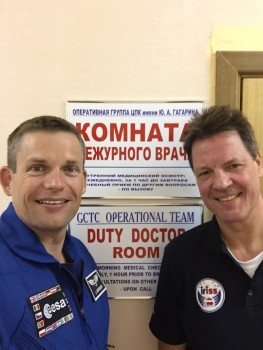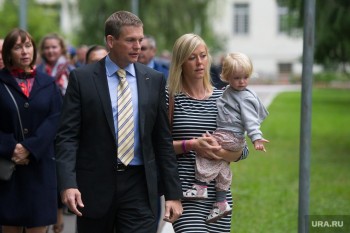While Andreas is in space one person in particular will be watching to make sure he is doing well: Crew Surgeon Ulrich Straube. In this selection of quotes, he introduces himself and his role in the iriss mission:
As a kid, like so many others, I was very interested in aircraft, rockets and spaceflight. As an adult, as well-trained physician, aerospace still drew my attention, but I never expected to become a flight surgeon.
When I realized there was a chance for me to work with European astronauts I found it quite a challenge to leave patients and the hospital I worked behind after nearly ten years.
Role
The Flight or Crew Surgeon has to face the fact that there is no way to ensure all astronauts stay young, healthy, in perfect shape and in a good mood while performing at their highest level at all times of their career, but it is still our top priority to ensure astronaut’s health and well-being at all times of their career.
During Andy’s flight as his Crew Surgeon I serve as a “first line of defence and advocate”. I am wary when mission control programmes sleep-shifting, schedule changes, hazardous activities, over tasking or if I notice stress symptoms or any other medical issues that may require medical-attention, support or protection.
“Space Adaptation Syndrome” consists of several symptoms such as fluid shifting from the lower to the upper body (also called “Puffy face and Chicken legs”. Other symptoms include nasal- and sinus decongestion, dizziness, headache, spatial disorientation, nausea, back pain as well as constipation and can impair many of people on their first days in space as well as when they return to Earth. While these symptoms usually disappear relatively quickly, the trouble for astronauts on long-duration spaceflights is the medical toll in regards to bone and muscle mass.
During mission
Countermeasures to alleviate problems use advanced systems on the Station on a regular basis. Even though the Space Station is certainly not a hospital (more like a really, really huge laboratory) we do have lots of medical equipment available. Sophisticated equipment for Optical Coherence Tomography, Ultrasound and Imaging, as well as medication allow for advanced medical care if need be. A highly sophisticate Life-Support System as well as a Caution and Warning system constantly monitor the Station and ensure a safe environment.
The crew surgeon has a regular personal and confidential medical communication, called “Private Medical Conferences”. Astronauts also have private audiovisual conferencing with their family to add to their health and well-being while flying in space.
Andreas Mogensen is a wonderful, charismatic person and hugely motivational, linking human spaceflight, the people of Denmark, Europe and all over the world. It is a distinct pleasure for me that I got to know Andy’s wife and daughter and consider them most definitely essential for mission success.




Discussion: one comment
I am a Japanese I am not good at English,so japanese ここに書かれていることが良く分からないのですが、一言言いたくて書きました、よろしくお願いします。